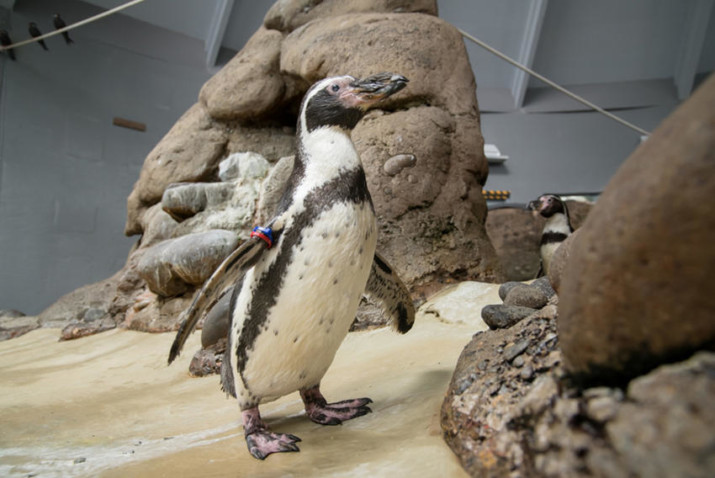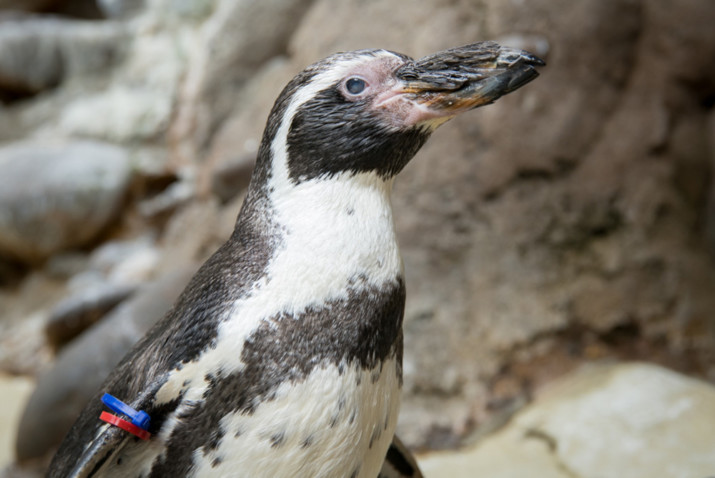Portland, January 8th, 2016. It was a chilly week at the Oregon Zoo. The deep…
Oregon Zoo Celebrates Remarkable Life of One of World’s Oldest Penguins


Penguin
Portland, OR. The Oregon Zoo bid a sad farewell in mid-September to Mochica, elder statesman of the Humboldt penguin colony and a distinguished seabird ambassador for more than three decades. At 31 years old, he was one of the oldest — and best-loved — penguins on the planet.
“Mochica was the oldest male of his species in any North American zoo or aquarium, maybe the whole world,” said Travis Koons, who oversees the zoo’s bird populations. “His remarkable longevity says a lot about both his zest for life and the quality of care he received over the years.”


Mochica hatched July 6, 1990, at the Oregon Zoo and was hand-reared, a standard practice at the time. But Mo, as he was known for short, grew up different from the other chicks. More than any penguin in the zoo’s large Humboldt colony, he enjoyed spending time with people, often choosing keepers’ quarters over the company of his fellow birds in the Penguinarium.
Here’s a video about the special penguin:
“It was pretty common to walk into the keeper kitchen area and find Mo ‘helping’ with the food prep or just hanging out with care staff there,” Koons said.
Mo was equally fond of visitors to the penguin area, who would meet him on behind-the-scenes tours. Eventually, Koons said, he became the zoo’s “greatest ambassador,” personally greeting thousands — perhaps tens of thousands — of visitors, and helping to raise awareness about a species in decline. It was a role he seemed to relish. As one former keeper put it, “Mochica rarely met an arm he didn’t love to groom.”
Wild Humboldt penguins seldom live past 20, and Mochica, who turned 31 in July, had been slowing down for several years. Over the past couple of years, animal-care staff had been monitoring him closely and treating a variety of age-related ailments.
“He had a mature cataract in one eye, old-age haze in the other, bilateral arthritis in his hips,” Koons said. “He was just a very old bird. It was hard for him to see, and at times difficult for him to walk.”
Koons praised the efforts of care staff, who did everything they could to ease the elderly penguin’s discomfort, sneaking a daily dose of meloxicam into his sustainable-seafood breakfast and scheduling regular laser-therapy sessions with specialists from Kenton Animal Hospital. Eventually, though, Mo’s conditions deteriorated, and on Saturday veterinary and care staff made the difficult decision to humanely euthanize him.
“It’s an incredibly sad day for his care team and for everyone who spent time with this amazing bird,” Koons said. “We’ve all had times in our lives where animals have left an indelible mark on our hearts. Mochica has done that for thousands of people. He inspired generations.”
Koons hopes Mochica’s legacy will be continued conservation, particularly for Humboldts, which among the most at-risk of penguin species with a population estimated at just 12,000 breeding pairs.
“Humboldt penguins live in a region that’s greatly affected by human activity,” he said. “They need healthy ocean habitats to thrive, and we can help make a difference — even in simple ways like downloading the Seafood Watch app and choosing sustainable seafood.”
Native to the South American coastline off Peru and Chile, Humboldt penguins are classified as “vulnerable” by the International Union for Conservation of Nature, and protected under the U.S. Endangered Species Act. They are threatened by overfishing of their prey species, entanglement in fishing nets, and breeding disruption due to commercial removal of the guano deposits where the birds lay their eggs.
The Oregon Zoo has supported Peru-based conservation organization ACOREMA’s work to protect the Humboldt penguin. ACOREMA monitors penguin mortality and works closely with San Andrés fishermen to mitigate the practice of hunting penguins for food. The group also trains volunteer rangers, reaching out to 3,000 students, teachers and Pisco-area residents a year to raise awareness about penguin conservation.
From Oregon Zoo:
The 64-acre Oregon Zoo is located in Portland, a city and surrounding metropolitan area of 2.26 million people. Annual attendance is more than 1.5 million, making the zoo the top paid attraction in the Pacific Northwest.
About the Oregon Zoo Foundation
The Oregon Zoo Foundation, the zoo’s philanthropic partner, plays an integral role in supporting the zoo’s animal welfare, conservation and education programs. Since its inception in 1997, the foundation, a 501(c)(3) nonprofit, has rasied more than $84 million for the zoo’s top priorities.
Recent Posts
2025 Portland Rose Festival Plans are Set
Portland, OR. The Portland Rose Festival has inspired the public to gather and celebrate against…
Portland Art Museum Exhibit Will Highlight Contemporary Art from the Collections of Jordan D. Schnitzer
Portland, OR. Opening in September 2025, the Portland Art Museum (PAM) presents Global Icons, Local Spotlight:…
VIPs Gearing up for Classic Wines Foundation Gala
Portland, OR. Organizers say the "Salon de Vin" benefit for Classic Wines is shaping up.…
Diamonds & Denim Gala Will Benefit The Links, Inc.
Portand, OR. The Portland Chapter of The Links, Incorporated, and the White Rose Educational Foundation…
Nonprofits Honored as Providence Health Plan Celebrates 40th Anniversary
Portland, OR. Providence Health Plan recently celebrated its 40th anniversary with a totally rad 1980’s…
Oregon Historical Society Hosts History Makers Gala
Portland, OR. The Oregon Historical Society’s (OHS) annual Oregon History Makers Awards & Dinner recognizes…


